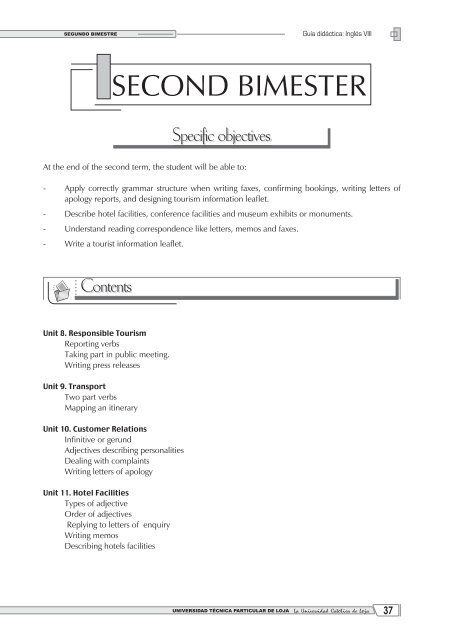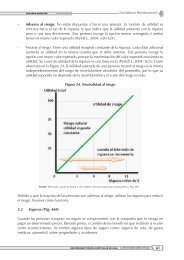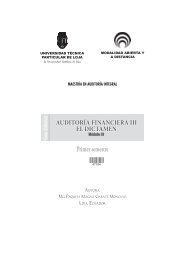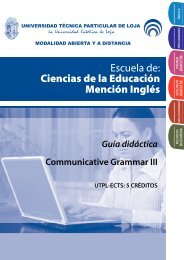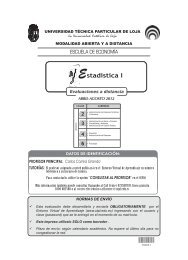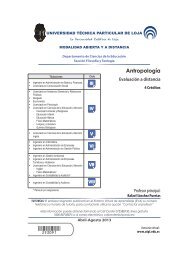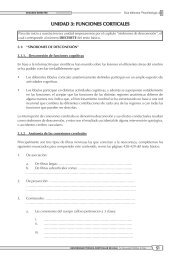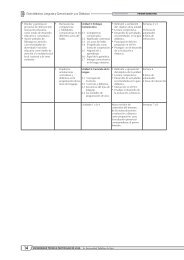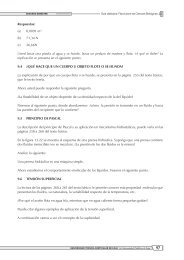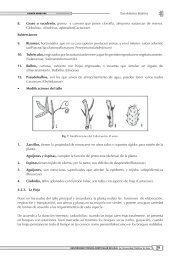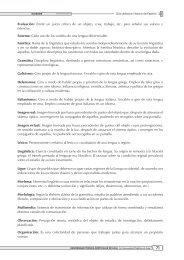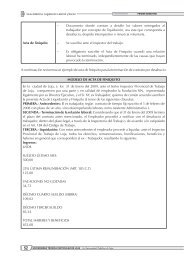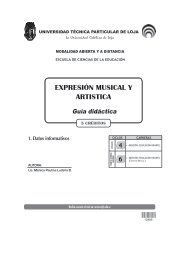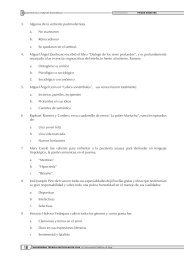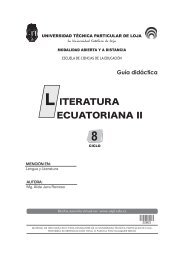SECOND BImESTER - Universidad Técnica Particular de Loja
SECOND BImESTER - Universidad Técnica Particular de Loja
SECOND BImESTER - Universidad Técnica Particular de Loja
You also want an ePaper? Increase the reach of your titles
YUMPU automatically turns print PDFs into web optimized ePapers that Google loves.
SEGUNDO BIMESTRE Guía didáctica: Inglés VIII<br />
<strong>SECOND</strong> <strong>BImESTER</strong><br />
Specifi c objectives<br />
At the end of the second term, the stu<strong>de</strong>nt will be able to:<br />
- Apply correctly grammar structure when writing faxes, confi rming bookings, writing letters of<br />
apology reports, and <strong>de</strong>signing tourism information leafl et.<br />
- Describe hotel facilities, conference facilities and museum exhibits or monuments.<br />
- Un<strong>de</strong>rstand reading correspon<strong>de</strong>nce like letters, memos and faxes.<br />
- Write a tourist information leafl et.<br />
Contents<br />
Unit 8. Responsible Tourism<br />
Reporting verbs<br />
Taking part in public meeting.<br />
Writing press releases<br />
Unit 9. Transport<br />
Two part verbs<br />
mapping an itinerary<br />
Unit 10. Customer Relations<br />
Infi nitive or gerund<br />
Adjectives <strong>de</strong>scribing personalities<br />
Dealing with complaints<br />
Writing letters of apology<br />
Unit 11. Hotel Facilities<br />
Types of adjective<br />
Or<strong>de</strong>r of adjectives<br />
Replying to letters of enquiry<br />
Writing memos<br />
Describing hotels facilities<br />
UNIVERSIDAD TÉCNICA PARTICULAR DE LOJA La <strong>Universidad</strong> Católica <strong>de</strong> <strong>Loja</strong> 37
Guía didáctica: Inglés VIII<br />
Unit 12. Selecting Locations<br />
Conjunctions<br />
Choosing a site for a hotel<br />
Formal and informal language<br />
Writing a report<br />
Writing promotional material<br />
Unit 13. Things to do<br />
Conditionals<br />
Writing a tourist information leaflet<br />
Writing and recording an answer phone message<br />
Unit 14. Marketing the Past<br />
Relative clauses<br />
Describing museum exhibits and monuments<br />
Writing notices<br />
Giving a gui<strong>de</strong>d tour.<br />
Advertising and publicity<br />
Unit 15. Business Travel<br />
Possibility and certainty<br />
Describing conference facilities<br />
Negotiating rates<br />
Telephone skills<br />
38<br />
UNIVERSIDAD TÉCNICA PARTICULAR DE LOJA La <strong>Universidad</strong> Católica <strong>de</strong> <strong>Loja</strong><br />
SEGUNDO BIMESTRE
SEGUNDO BIMESTRE Guía didáctica: Inglés VIII<br />
Learning process <strong>de</strong>velopment<br />
U<br />
NIT 8:<br />
RESPONSIBLE TOURISM<br />
Dear stu<strong>de</strong>nt, it is time to start the second term of our subject, I wish you all the best during this time.<br />
PREVIEW<br />
Open your book on page 50. The title of this unit is “Responsible Tourism”, it is<br />
important to consi<strong>de</strong>r what it means.<br />
Responsible Tourism is a tourism management strategy embracing planning,<br />
management, product <strong>de</strong>velopment and marketing to bring about social, cultural,<br />
positive economic and environmental impacts.<br />
For tourism operators it is about providing more rewarding holiday experiences for guests as enabling<br />
local communities to enjoy a better quality of life and conserving the natural environment.<br />
After having in mind about the responsible tourism, answer the provi<strong>de</strong>d questions.<br />
READING<br />
You will read about ways in Waikiki can <strong>de</strong>velop sustainable tourism. After you read, <strong>de</strong>velop the<br />
activity 3.<br />
Did you know?<br />
Waikiki: a holiday are on the south coast of Oahu Island in Hawaii sustainable tourism is a form of tourism combined<br />
with planned economic growth which will not <strong>de</strong>stroy the host environment or culture.<br />
UNIVERSIDAD TÉCNICA PARTICULAR DE LOJA La <strong>Universidad</strong> Católica <strong>de</strong> <strong>Loja</strong> 39
SPEECHWORK<br />
40<br />
Guía didáctica: Inglés VIII<br />
UNIVERSIDAD TÉCNICA PARTICULAR DE LOJA La <strong>Universidad</strong> Católica <strong>de</strong> <strong>Loja</strong><br />
SEGUNDO BIMESTRE<br />
Good pronunciation will give you greater confi<strong>de</strong>nce, whether you are <strong>de</strong>aling with customers, taking<br />
part in discussions or guiding groups of visitors. For this reason, do the exercises 4 and 5 on page 51.<br />
Listen to the tape as many times as you need. Repeat the words after the speaker.<br />
LISTENING<br />
Before listening, check the following vocabulary: environmental issues, <strong>de</strong>tergents, springs, streams,<br />
protected area, wildlife habitats.<br />
Now, listen to michael Leech as many times as you need, and take notes to answer the provi<strong>de</strong>d<br />
questions of activities 6 and 7 on page 52.<br />
LANGUAGE FOCUS<br />
On page 53, there is a clear explanation referring to reported speech. Read carefully this information.<br />
Exercise 1<br />
TELL somebody:<br />
• Sonia told me that you were ill.<br />
SAY somebody:<br />
• Sonia said that you were ill.<br />
In most lines of the following passages there is a grammatical mistake. Un<strong>de</strong>rline the mistake and<br />
write the correct form on the right. If there is no mistake put a tick (P)<br />
By following these simple gui<strong>de</strong>lines, you can help preserving<br />
the<br />
1. Preserve .<br />
unique environment and ancient cultures of the Himalayas. 2. ______________<br />
Limit <strong>de</strong>forestation – make no open fires and discourage<br />
others<br />
people from doing so on your behalf. Where water has heated<br />
by<br />
3. ______________<br />
4. ______________<br />
scare firewood, use a few as possible. When possible, choose 5. ______________<br />
an accommodation that uses kerosene or fuel – efficient wood<br />
stoves<br />
6. ______________
SEGUNDO BIMESTRE Guía didáctica: Inglés VIII<br />
Remove litter, burn or bury paper and carry out all non–<br />
<strong>de</strong>gradable litter.<br />
The graffiti are permanent examples of environment<br />
pollution.<br />
Help your gui<strong>de</strong>s and porters to follow conservational<br />
measures.<br />
7. ______________<br />
8. ______________<br />
9. ______________<br />
Like a guest, respect local traditions and maintain local pri<strong>de</strong>. 10. ______________<br />
The Himalayas may change you – please do not change<br />
themselves.<br />
Source: English for International Tourism Teacher’s Resource Book (Unit 8).<br />
VOCABULARY<br />
11. ______________<br />
First, look at the picture on page 54. You can see an Indian woman who is standing. She is wearing a<br />
sari. A sari or saree is a female garment in the Indian subcontinent. I suggest that you look for information<br />
about India, because it is an amazing country.<br />
Before doing the activity 12, <strong>de</strong>velop the activity 11. Using that vocabulary, fill in the gaps.<br />
Did you know?<br />
Goa is on the Malabar coast, adjoining the Arabian Sea, which provi<strong>de</strong>s the beach holidays that Goa is internationally<br />
famous for. This smallest state is part of a larger cultural region known as Konkan. And for 450 years Goa was<br />
formerly part of Portuguese India.<br />
SPEAKING<br />
Dear stu<strong>de</strong>nt, take into account that public meetings are a great way of putting i<strong>de</strong>as into the public<br />
domain, finding allies and securing support for a campaign. Please, read carefully the tip box on page<br />
55. Now, do the activities 15 and 16.<br />
UNIVERSIDAD TÉCNICA PARTICULAR DE LOJA La <strong>Universidad</strong> Católica <strong>de</strong> <strong>Loja</strong> 41
42<br />
Guía didáctica: Inglés VIII<br />
SELF – EVALUATION No.8<br />
UNIVERSIDAD TÉCNICA PARTICULAR DE LOJA La <strong>Universidad</strong> Católica <strong>de</strong> <strong>Loja</strong><br />
SEGUNDO BIMESTRE<br />
Dear stu<strong>de</strong>nt, now you have read all the information regarding this chapter, open your workbook and<br />
do the following optional activities:<br />
• In Vocabulary 1 section, <strong>de</strong>velop exercise 1 on page 39.<br />
• In Reading section, <strong>de</strong>velop exercise 1 on pages 40.<br />
• In Writing section, <strong>de</strong>velop exercise 1 on page 41.<br />
Important: If you have any doubt regarding this chapter call me or write me an e-mail<br />
immediately.
PREVIEW<br />
SEGUNDO BIMESTRE Guía didáctica: Inglés VIII<br />
U<br />
NIT 9:<br />
RESPONSIBLE TOURISM<br />
Let’s start the unit nine. It is about transport; take into account that transport is the<br />
movement of people and goods from one place to another. In this unit you are going<br />
to learn how to plan a transport network.<br />
All of these topics you find from page 56 to 61.<br />
Nowadays we can travel from one place to another in different ways: by air, road, sea or rail because<br />
there are different means of transport such as cars, buses, bicycles, coaches, trains, planes, ferries, etc.<br />
Before doing the exercise 1 on page 56. Look at the four means of transport and answer these<br />
questions:<br />
a) Which is the most expensive means of transport?__________________<br />
b) Which is the most comfortable means of transport? ________________<br />
c) Which is the cheapest means of transport? ________________________<br />
LISTENING<br />
Look at the below map carefully to see the places she stayed in or visited during her trip. Play the CD<br />
twice. Follow Susan’s route. Answer the provi<strong>de</strong>d questions on page 56.<br />
LANGUAGE FOCUS<br />
This section is about phrasal verb. Read carefully this information and try to un<strong>de</strong>rstand it, because it is<br />
useful for the practice.<br />
If you check the unit five on page 30, you find some information about it.<br />
Separable phrasal verbs:<br />
• turn on, put off, rip off, ask out, call back, find out can take<br />
an object in the middle of the phrasal verbs or after the phrasal<br />
verbs.<br />
Teachers should encourage kids to find things<br />
out for themselves.<br />
UNIVERSIDAD TÉCNICA PARTICULAR DE LOJA La <strong>Universidad</strong> Católica <strong>de</strong> <strong>Loja</strong> 43
Exercise 1:<br />
Guía didáctica: Inglés VIII<br />
Match these <strong>de</strong>finitions with each of the phrasal verbs in bold type.<br />
1. They’ve put forward plans for new kitchens.<br />
They certainly look good!<br />
2. We’ll have to throw all that yoghurt out. It’s<br />
out–of–date.<br />
44<br />
UNIVERSIDAD TÉCNICA PARTICULAR DE LOJA La <strong>Universidad</strong> Católica <strong>de</strong> <strong>Loja</strong><br />
SEGUNDO BIMESTRE<br />
____ a. cause to fall to<br />
the ground<br />
____ b. break a promise<br />
3. I don`t think beer ice–cream will ever catch on ____ c. suggest<br />
4. You promise to cook tomorrow and you can’t<br />
back out of it now.<br />
5. Don’t put that bowl there. Someone will knock<br />
it over.<br />
At work in the k itchen<br />
____ d. dispose of<br />
____ e. become popular<br />
Source: Pohl, A. (2002): Test your Professional English Hotel and Catering, page 45.<br />
VOCABULARY<br />
On page 58, read and classify these words in categories (sea, rail, road, phrasal verbs). This activity will<br />
help you to <strong>de</strong>velop a richer vocabulary.<br />
Now, for the activity 5, write a short account of the trip. This activity will help you to improve vocabulary,<br />
comprehension and grammar.<br />
LISTENING<br />
As you gain proficiency in un<strong>de</strong>rstanding spoken English, you tend to focus on the key words to <strong>de</strong>rive<br />
meaning, either ignoring or guessing at the less prominent words. Develop the exercise 6.<br />
At this time, listen to the messages as many times as nee<strong>de</strong>d to complete the task.<br />
SPEAKING<br />
Dear stu<strong>de</strong>nt, it is important for you to practice speaking so read aloud the following messages.
SEGUNDO BIMESTRE Guía didáctica: Inglés VIII<br />
Would Mr. Michael Long please report to<br />
the Flight Information Desk situated in the<br />
main Entrance Hall?<br />
Source: www.talkingcommunities.com<br />
a) We regret to announce a <strong>de</strong>lay of approximately a quarter of an hour to the <strong>de</strong>parture of Flight<br />
KLm 452 for Lima via Amsterdam. This is owing to a slight technical problem.<br />
b) Would the owner of a red Ford Escort registration number L632 NVK please remove this vehicle<br />
immediately from the entrance where it is causing an obstruction?<br />
c) We are now approaching the harbor entrance. Will all drivers of vehicles please proceed to the<br />
car <strong>de</strong>ck?<br />
READING<br />
As you read the following extracts on page 59, think about the answer to the provi<strong>de</strong>d question in<br />
activity 11.<br />
SELF – EVALUATION No.9<br />
Dear stu<strong>de</strong>nt, now you have read all the information regarding this chapter, open your workbook and<br />
do the following optional activities:<br />
• In Vocabulary 1 section, <strong>de</strong>velop exercises 1 and 2 on page 42.<br />
• In Reading section, <strong>de</strong>velop exercise 1 on pages 46 and 47.<br />
Important: If you have any doubt regarding this chapter call me or write me an e-mail immediately.<br />
UNIVERSIDAD TÉCNICA PARTICULAR DE LOJA La <strong>Universidad</strong> Católica <strong>de</strong> <strong>Loja</strong> 45
46<br />
Guía didáctica: Inglés VIII<br />
U<br />
NIT 10:<br />
CUSTOMER RELATIONS<br />
Source:www.cartoonstock.com<br />
UNIVERSIDAD TÉCNICA PARTICULAR DE LOJA La <strong>Universidad</strong> Católica <strong>de</strong> <strong>Loja</strong><br />
SEGUNDO BIMESTRE<br />
Dear stu<strong>de</strong>nt, open your book on page 62. Now, let’s start the unit ten. It is about customer relations<br />
which are at the heart of every business.<br />
PREVIEW<br />
This section introduces new vocabulary for talking about personal qualities. First look at the picture on<br />
page 62. Now answer the following questions:<br />
a) How many people are there? .<br />
b) Where are they? .<br />
c) What are they doing? .<br />
d) Who is smiling? .<br />
Ok, maybe the three people are in the Information <strong>de</strong>sk and talking about a tour. The travel agent is<br />
smiling and she looks friendly. Do you agree?<br />
VOCABULARY<br />
Lucia is very punctual. She is never late, and she always arrives on time. Do you know someone who<br />
is very punctual? Who is he/she?<br />
At this time, open your book on page 62. There is a list of adjectives about the good qualities that<br />
a person should have to <strong>de</strong>al with customers. If you add prefixes (un-, im-, ir-, etc.), you find their<br />
opposites.
SEGUNDO BIMESTRE Guía didáctica: Inglés VIII<br />
Opposites:<br />
passionate → apathetic<br />
outgoing →shy<br />
intelligent →stupid<br />
reserved → talkative<br />
hardworking → lazy<br />
easygoing → nervous<br />
Now, for the activity 3 write a short account of the trip. This activity will help you to improve vocabulary,<br />
comprehension and grammar.<br />
READING<br />
Read the following passage on page 62. Un<strong>de</strong>rlined the new words and look for their meaning. Finally<br />
answer the provi<strong>de</strong>d questions.<br />
The following vocabulary is from the reading selection:<br />
strike up a conversation = start a conversation with someone<br />
well groomed = neat<br />
keep an eye on = pay attention to<br />
LANGUAGE FOCUS<br />
This section is useful, because you can consult it during the unit or for distance evaluation. Read carefully<br />
the grammar reference on page 64 of your book for further information about infinitive or gerund.<br />
Exercise 1:<br />
In British English, there is<br />
sometimes a difference between:<br />
“I like doing something” = “I<br />
enjoy it”<br />
You like cooking<br />
“I like to do something” means<br />
“I think it is good or right to do it”<br />
You like people to be on time.<br />
Put in a suitable verb in the correct form: – ing or to… Sometimes either form is possible.<br />
1. It’s nice to be with other people but sometimes I enjoy ______________ alone.<br />
UNIVERSIDAD TÉCNICA PARTICULAR DE LOJA La <strong>Universidad</strong> Católica <strong>de</strong> <strong>Loja</strong> 47
48<br />
Guía didáctica: Inglés VIII<br />
2. I’m not quiet ready yet. Do you mind________________ a little longer?<br />
3. When I was a child, I hated ________________________ to bed early.<br />
4. I don’t enjoy _______________ letters. I can never think what to write.<br />
5. I need a new job. I can’t stand _____________________ here any more.<br />
UNIVERSIDAD TÉCNICA PARTICULAR DE LOJA La <strong>Universidad</strong> Católica <strong>de</strong> <strong>Loja</strong><br />
SEGUNDO BIMESTRE<br />
6. When I have to catch a train, I’m always worried that I’ll miss it. So I like _____________________<br />
to the station in plenty of time.<br />
7. Have you got a moment? I’d like ___________ to you about something.<br />
Source: murphy R. (1994): English Grammar in Use, page 115.<br />
Exercise 2:<br />
Read the phrases on the left; then write them more politely. Use each phrase once only.<br />
Just a moment… Would you mind… Please…<br />
I’m afraid… may I suggest… Would you like…<br />
1. Wait a minute! ____________________ , please<br />
2. We haven’t got any left. ____________________ , we haven’t got any left.<br />
3. Sit down, please. ____________________ , take a seat.<br />
4. Try this is organic wine. _____________________ that you try this organic wine.<br />
5. Do you want some water? _____________________ some water?<br />
6. move to another table! _____________________ moving to another table?<br />
Source: Pohl, A. (2002): Test your Professional English Hotel and Catering, page 52.<br />
READING<br />
For this activity 8, first listen to “Melanie Flowers” again (activity 5 on page 63). After that, think about<br />
the answer to the provi<strong>de</strong>d questions on page 65.<br />
The following vocabulary is from the next reading selection:<br />
state of affairs = a situation<br />
to pay = to be worthwhile<br />
to dip =to go down<br />
Now, read the article on the right of si<strong>de</strong> page 65. Un<strong>de</strong>rlined the new words and look for their<br />
meaning. Finally <strong>de</strong>ci<strong>de</strong> if these sentences are true or false.
SEGUNDO BIMESTRE Guía didáctica: Inglés VIII<br />
SPEAKING<br />
Dear stu<strong>de</strong>nt, to <strong>de</strong>velop this activity, you have to take into account the tip box on the left si<strong>de</strong> of the<br />
page 65.<br />
I suggest that you read aloud your presentation.<br />
WRITING<br />
During this unit, we were talking about handling complaints. Therefore read the eight sentences of the<br />
activity 11 on page 66 and <strong>de</strong>ci<strong>de</strong>d if you agree or disagree with them.<br />
On the right of page 66, there is a letter of complaint, please read it. After that, write a response letter<br />
so that you can apologize to ms. Shapur.<br />
Here is a suggested letter of apology.<br />
Dear Ms Shapur,<br />
Thank you for your letter of 7 July. Please<br />
accept my apologies for your unfortunate<br />
experience in our café.<br />
We pri<strong>de</strong> ourselves on our high standard of<br />
service. Unfortunately, July is not only a very<br />
busy season but also a time for annual leave.<br />
On this particular day 3 employees were off<br />
sick. As a result, we have now taken on extra<br />
staff and <strong>de</strong>veloping a training programme.<br />
I enclose a voucher for a free meal and glass of<br />
wine and hope you will notice improvements<br />
in our service.<br />
Your sincerely,<br />
UNIVERSIDAD TÉCNICA PARTICULAR DE LOJA La <strong>Universidad</strong> Católica <strong>de</strong> <strong>Loja</strong> 49
50<br />
Guía didáctica: Inglés VIII<br />
SELF – EVALUATION No.10<br />
UNIVERSIDAD TÉCNICA PARTICULAR DE LOJA La <strong>Universidad</strong> Católica <strong>de</strong> <strong>Loja</strong><br />
SEGUNDO BIMESTRE<br />
Dear stu<strong>de</strong>nt, now you have read all the information regarding this chapter, open your workbook and<br />
do the following optional activities:<br />
• In Vocabulary 1 section, <strong>de</strong>velop exercises 1 and 2 on page 48.<br />
• In Writing 1 section, <strong>de</strong>velop exercise 1 on pages 49.<br />
Important: If you have any doubt regarding this chapter call me or write me an e-mail immediately.
SEGUNDO BIMESTRE Guía didáctica: Inglés VIII<br />
U<br />
NIT 11:<br />
HOTELS FACILITIES<br />
Let’s start the unit eleven. This unit is about hotel facilities, we are going to learn how using adjectives<br />
to <strong>de</strong>scribe hotel facilities. In addition, we will learn how making and answering enquiries, these topics<br />
are from page 70 to 75.<br />
PREVIEW<br />
Dear stu<strong>de</strong>nt, think about what is a hotel? So, a hotel is an establishment that provi<strong>de</strong>s paid lodging,<br />
usually on a short-term basis. Here customers rest and relax, for that reason they always expect from a<br />
good hotel:<br />
- comfort: comfortable beds, own bathroom, hot water<br />
- pleasant surroundings and décor<br />
- polite, helpful efficient staff<br />
- cleanliness<br />
- good food<br />
- in the room: DD telephone, color TV, satellite TV, vi<strong>de</strong>o, hair dryer, mini bar, bath , shower.<br />
- In the hotel: restaurant, bar, room service, car parking, swimming pool, etc.<br />
READING<br />
Read “Tommaso Zanzotto talks about Hilton international… ” on page 70 and read “Richard Williams<br />
talks abaut Sandy Lane” on page 112. They <strong>de</strong>scribe the organization of two hotels. When you finish<br />
the reading, write questions about them.<br />
Exercise 1:<br />
After you read “Tommaso Zanzotto talks about Hilton international…” Look for and find words to<br />
complete the chart.<br />
Hotel facilities Adjectives Verbs<br />
UNIVERSIDAD TÉCNICA PARTICULAR DE LOJA La <strong>Universidad</strong> Católica <strong>de</strong> <strong>Loja</strong> 51
Exercise 2:<br />
52<br />
Guía didáctica: Inglés VIII<br />
UNIVERSIDAD TÉCNICA PARTICULAR DE LOJA La <strong>Universidad</strong> Católica <strong>de</strong> <strong>Loja</strong><br />
SEGUNDO BIMESTRE<br />
The following guests have different wishes. Which section of the room information sheet should they<br />
look at? Write the number of each guest next to the appropriate section.<br />
1. Elaine Lu would like to have her blouse cleaned.<br />
2. Ben Krozac wants to know about buses to the airport.<br />
3. The Nakatas would like breakfast in their room.<br />
4. ms. Lewis is feeling unwell.<br />
5. mr. Dixon needs clean shoes for the morning.<br />
6. Jutta Koch would like a massage and manicure.<br />
INFORMATION<br />
Room service _____ Medical help _____<br />
Transport _____ Beauty saloon _____<br />
Shoe–cleaning service _____ Laundry _____<br />
Source: Pohl, A. (2002): Test your Professional English Hotel and Catering, page 14.<br />
VOCABULARY<br />
Before doing the activity 4 on page 71, match the 12 pictures with their names. Remember, this activity<br />
will help you to <strong>de</strong>velop a richer vocabulary.<br />
___ trouser press ___ television ___ ornamental gar<strong>de</strong>ns<br />
___ beauty saloon ___ newspaper ___ gift shop<br />
___ swimming pool ___ telephone ___ tea/coffee making facilities<br />
___ tennis court ___ bed ___ free garage space
a.<br />
SEGUNDO BIMESTRE Guía didáctica: Inglés VIII<br />
b.<br />
e. f. g. h.<br />
i. j.<br />
LANGUAGE FOCUS<br />
c.<br />
In this section you will find clear explanation and activities about adjectives and word or<strong>de</strong>r. Read<br />
carefully this information. (page 71)<br />
Exercise 3:<br />
When we use more than one adjective before a noun, we have to <strong>de</strong>ci<strong>de</strong> in<br />
what or<strong>de</strong>r to put them. Adjectives that express opinion normally go before<br />
fact adjectives. Generally, the adjective which is closest to the noun has<br />
the closest link in meaning with the noun and express the most permanent<br />
quality. The adjective that is a matter of opinion is mentioned farthest from<br />
the noun.<br />
Put the adjectives in brackets in the correct position.<br />
1. A beautiful table (woo<strong>de</strong>n / round) _____________________________________<br />
2. An usual ring (gold) _________________________________________________<br />
3. A new pullover (nice) ________________________________________________<br />
k.<br />
UNIVERSIDAD TÉCNICA PARTICULAR DE LOJA La <strong>Universidad</strong> Católica <strong>de</strong> <strong>Loja</strong> 53<br />
d.<br />
l.
Guía didáctica: Inglés VIII<br />
4. An old house (beautiful) ________________________________________________<br />
54<br />
UNIVERSIDAD TÉCNICA PARTICULAR DE LOJA La <strong>Universidad</strong> Católica <strong>de</strong> <strong>Loja</strong><br />
SEGUNDO BIMESTRE<br />
5. An old painting (interesting / French) ______________________________________<br />
Source: murphy R. (1994): English Grammar in Use, page 29.<br />
READING<br />
On page 72 of your book, there are four examples about how to reply a customer’s letter, who is asking<br />
for information about the hotel facilities. Pay attention to some expressions used in or<strong>de</strong>r to call the<br />
customer’s attention.<br />
Did you know?<br />
Berlin is the capital city and one of sixteen states of Germany. Tierpark Friedrichsfel<strong>de</strong> is one of the most visited<br />
places. It is a zoological where live several rare species.<br />
WRITING<br />
In this section, using the dictionary find the meaning of the following words: tariffs, forthcoming, seminar<br />
rooms, <strong>de</strong>legates, to host, multi–storey.<br />
Now, there is a letter on page 73, please read it. After that, write a response letter using the below<br />
information. Here is a suggested letter.<br />
Thank you for your letter of 2 December<br />
in which you show interest in holding a<br />
conference for 100 <strong>de</strong>legates from 27 – 30<br />
november of next year in our hotel.<br />
Our hotel is situated in the centre of Berlin<br />
within easy reach of the museums and<br />
monuments of our beautiful city. There are<br />
good transport links to all areas.<br />
Please note that:<br />
The hotel has a large conference housing a<br />
total of 17 conference rooms…<br />
Your sincerely,<br />
Senior Reservations Clerk
SEGUNDO BIMESTRE Guía didáctica: Inglés VIII<br />
Now, read the sentences on page 74. Deci<strong>de</strong> if the two words linked by and are in the right or<strong>de</strong>r.<br />
American English<br />
and is sometimes dropped after<br />
the base forms go and come<br />
Go jump in the river.<br />
SELF – EVALUATION No.11<br />
Dear stu<strong>de</strong>nt, now you have read all the information regarding this chapter. Do the following optional<br />
activities of your workbook:<br />
• In Language focus section, <strong>de</strong>velop exercises 1, 2 and 3 on page 54.<br />
• In Writing section, <strong>de</strong>velop exercise 1 on page 56.<br />
Important: If you have any doubt regarding this chapter call me or write me an e-mail immediately, we<br />
can find a solution together. Try to do the activities without directly going to the answer key section of<br />
your workbook.<br />
UNIVERSIDAD TÉCNICA PARTICULAR DE LOJA La <strong>Universidad</strong> Católica <strong>de</strong> <strong>Loja</strong> 55
56<br />
Guía didáctica: Inglés VIII<br />
U<br />
NIT 12:<br />
SELECTING LOCATIONS<br />
Source: farm1.static.flickr.com/84/261665937_e01da22f90_o.jpg<br />
UNIVERSIDAD TÉCNICA PARTICULAR DE LOJA La <strong>Universidad</strong> Católica <strong>de</strong> <strong>Loja</strong><br />
SEGUNDO BIMESTRE<br />
Dear stu<strong>de</strong>nt, travelling to faraway places is one of the most fascinating ways to spend your leisure<br />
time. Imagine yourself in the middle East, in the Amazon, or in Paris. Imagine where you have been<br />
and how you arrived at this <strong>de</strong>stination. As you imagine, <strong>de</strong>scribe everything that you see, hear, smell,<br />
feel, perceive.<br />
_____________________________________________________________________________________<br />
_____________________________________________________________________________________<br />
_____________________________________________________________________________________<br />
PREVIEW<br />
There are some factors that a hotel chain has to take into account when choosing a site, such as:<br />
location, rates, price of land, transport links, <strong>de</strong>sirability of area, number of hotels in locality and their<br />
average occupancy rates, support services, government grants, etc.<br />
According to the above information, there are some possible locations for a new hotel in the <strong>de</strong>velopment<br />
countries, such as: established central tourist area, new commercial <strong>de</strong>velopment site and suburban<br />
resi<strong>de</strong>ntial area.<br />
LISTENING<br />
Open your book on page 76, using the dictionary find the meaning of the following words: catamaran,<br />
biplane, chalet, courtyard, scuba diving, snorkeling, snooker, badminton.
SEGUNDO BIMESTRE Guía didáctica: Inglés VIII<br />
Now, listen to the CD as many times as necessary for doing this activity because the more you listen,<br />
the more you un<strong>de</strong>rstand the language.<br />
WRITING 1<br />
Before you <strong>de</strong>velop this task, read the following vocabulary:<br />
Now, you can continue doing the exercise 3.<br />
WRITING<br />
English → Spanish<br />
a message sent by fax: un<br />
mensaje enviado por fax.<br />
fax number: número <strong>de</strong> fax<br />
I’ve faxed the invioce: he<br />
enviado la factura por fax.<br />
Think about London, and answer the provi<strong>de</strong>d questions on page 77. If it is possible, practice it with a<br />
partner or a relative in or<strong>de</strong>r to improve your speaking skill.<br />
ç<br />
SPEAKING<br />
As you read the following selection, think about the answer to the provi<strong>de</strong>d questions in the activity 8<br />
of page 78.<br />
Did you know?<br />
Docklands, to the east of the city of London, was once a busy port and the industrial centre of London. After a period<br />
of <strong>de</strong>cline it is now being regenerated as a thriving business <strong>de</strong>velopment area.<br />
VOCABULARY<br />
In formal situations we have to use formal language in or<strong>de</strong>r to give good impression. In English there<br />
are some words or expressions that replace the informal ones.<br />
UNIVERSIDAD TÉCNICA PARTICULAR DE LOJA La <strong>Universidad</strong> Católica <strong>de</strong> <strong>Loja</strong> 57
For example:<br />
58<br />
Guía didáctica: Inglés VIII<br />
UNIVERSIDAD TÉCNICA PARTICULAR DE LOJA La <strong>Universidad</strong> Católica <strong>de</strong> <strong>Loja</strong><br />
SEGUNDO BIMESTRE<br />
Big is replaced by radical, spacious, handsome, large-scale<br />
A lot is replaced by substantial, a wi<strong>de</strong> range of, a great <strong>de</strong>al of, wi<strong>de</strong>spread<br />
Based on this information, see the examples on page 79 of your book and do the activity 10.<br />
LANGUAGE FOCUS<br />
Please review page 80, in this section you will find clear explanation and activities about adjectives and<br />
word or<strong>de</strong>r. Read carefully this information.<br />
Exercise 1:<br />
When we speak or write, we usually need to make some connection with<br />
other things that we are saying or writing.<br />
- As a result… (a new piece of information)<br />
- Because… (the reason of something)<br />
- However… (a contrasting point of view)<br />
- In addition… (add information after a long sentence)<br />
- So… (the result of something)<br />
Read again the article on page 78 of your book. Answer the following questions:<br />
1. Un<strong>de</strong>rline the reason why they are looking for tourism or leisure type, what word introduce the<br />
reason?___________________________________________<br />
2. Find a reason that comes at the beginning of a sentence. ________________<br />
SELF – EVALUATION No.12<br />
Dear stu<strong>de</strong>nt, now you have read all the information regarding this unit, do the following optional<br />
activities of your workbook:<br />
• In Language Focus 1 section, <strong>de</strong>velop exercises 1 and 2 on page 59.<br />
• In Vocabulary section, <strong>de</strong>velop exercises 1 and 2 on page 60.<br />
Important: If you have any doubt regarding this chapter call me or write me an e-mail immediately.
SEGUNDO BIMESTRE Guía didáctica: Inglés VIII<br />
U<br />
NIT 13:<br />
THINGS TO DO<br />
Dear stu<strong>de</strong>nt, open your book on page 82. Now, let’s start the unit thirteen. It is about tourist information<br />
centres, and also you are going to learn how to write a tourist information leaflet, to give tourists advice<br />
and suggestions on tourist attractions. All of these topics you will find from page 82 to 87.<br />
PREVIEW<br />
most of people take a tour because they want to see it all! For many, this will be the only time there are<br />
able to visit the <strong>de</strong>stination and you had better believe they will want to see everything possible while<br />
they are there. Even if your tour’s theme is “Cuisine of New Orleans”, you will need to round out your<br />
adventure with a variety of relaxing activities. These activities may vary <strong>de</strong>pending on the attractions the<br />
place offers; among others we can mention: swimming, sailing, <strong>de</strong>ep-sea fishing, and whale watching,<br />
visiting museums and historic houses, bird-watching, shopping in the towns and cities, dancing in the<br />
evenings at the disco, going to the cinema, going to fancy restaurants, etc.<br />
Now, do the activity 1.<br />
READING<br />
Here using the dictionary find the meaning of the following words: <strong>de</strong>ep –sea, glimpse, crafts, toddlers.<br />
These words are used in the reading. Now, on page 82, do the activity 2.<br />
VOCABULARY<br />
Look at the pictures on page 83; they are some activities and sports that end in –ing. For example:<br />
canoeing, scuba – diving, etc. Now name the other activities.<br />
For the activity 4, use the following word map. Think of as many activities as you can in one category.<br />
EXHIL ARATING ACTIVITIES<br />
white –water<br />
raft ing<br />
visit ing a zoo<br />
ENTERTAINING<br />
RELAXI NG<br />
fishing<br />
UNIVERSIDAD TÉCNICA PARTICULAR DE LOJA La <strong>Universidad</strong> Católica <strong>de</strong> <strong>Loja</strong> 59
60<br />
Guía didáctica: Inglés VIII<br />
LANGUAGE FOCUS<br />
UNIVERSIDAD TÉCNICA PARTICULAR DE LOJA La <strong>Universidad</strong> Católica <strong>de</strong> <strong>Loja</strong><br />
SEGUNDO BIMESTRE<br />
On page 85, you will find clear explanation and activities about conditional. Read carefully this<br />
information.<br />
LISTENING<br />
We use if:<br />
+ present simple (if I do / if I see) for the future.<br />
+ past, when we imagine something.<br />
… would when we ask somebody to so something.<br />
(not “when”) for things that will possible happen.<br />
First, look at the map on page 86; now listen to the conversations as many times as you need to do the<br />
activity.<br />
Exercise 1:<br />
Answer the following questions about the conversation:<br />
1. How many days are they planning to stay in Venice?<br />
________________________________________________________________<br />
2. What does the tourist ask to the information officer?<br />
________________________________________________________________<br />
3. Where is the Palazzo Fortuni museum?<br />
________________________________________________________________<br />
4. What place to eat does the information officer recommend them?<br />
________________________________________________________________<br />
SPEAKING<br />
For this activity 11, check the tapescripts on page 122 of the activity 10. Try to do your own conversation<br />
using the below information on page 86.<br />
If it is possible, practice it with a partner or a relative in or<strong>de</strong>r to improve your speaking skill.
SEGUNDO BIMESTRE Guía didáctica: Inglés VIII<br />
SELF – EVALUATION No.13<br />
Dear stu<strong>de</strong>nt, open your workbook and do the following optional activities:<br />
• In Vocabulary 2 section, <strong>de</strong>velop exercise 1 on page 65.<br />
• In Writing 2, <strong>de</strong>velop exercise 1 on pages 66 and 67.<br />
Important: If you have any doubt regarding this chapter call me or write me an e-mail immediately. Try<br />
to do the activities without directly going to the answer key section of your workbook.<br />
UNIVERSIDAD TÉCNICA PARTICULAR DE LOJA La <strong>Universidad</strong> Católica <strong>de</strong> <strong>Loja</strong> 61
62<br />
Guía didáctica: Inglés VIII<br />
U<br />
NIT 14:<br />
MARKETING THE PAST<br />
UNIVERSIDAD TÉCNICA PARTICULAR DE LOJA La <strong>Universidad</strong> Católica <strong>de</strong> <strong>Loja</strong><br />
SEGUNDO BIMESTRE<br />
Dear stu<strong>de</strong>nt, before reading the contents of the unit fourteen, remember the importance of museums.<br />
There are many things from the past such as warfare, jewelry, clothing, metals, sculptures, etc, that<br />
are kept in museums in or<strong>de</strong>r to preserve our history and culture and un<strong>de</strong>rstand our origins and<br />
because they are beautiful and interesting; so that everyone, not just a privileged few, can enjoy them.<br />
Therefore, the role of the museum is to educate and amuse people.<br />
PREVIEW<br />
First look at the four pictures on page 88, and name them. After that, answer the provi<strong>de</strong>d questions.<br />
Now let’s read the following cards, and match them with their names.<br />
READING<br />
As you read the following selection, think about the answer to the provi<strong>de</strong>d questions in the activity 2<br />
of page 88.<br />
Did you know?<br />
The Louvre in Paris, France, was the home of the kings of France until Louis<br />
XIV moved the court of Versailles. In 1973 it became a national museum.
SEGUNDO BIMESTRE Guía didáctica: Inglés VIII<br />
LISTENING<br />
Listen to the conversations as many times as you need to do the activity. Remember it help you<br />
un<strong>de</strong>rstand how people speak English in different parts of the world. You can see the tapescript on<br />
page 122.<br />
WRITING<br />
Write a short <strong>de</strong>scription of the bust of Nefertiti using the words from the box of page 89.<br />
For this activity 8, first look for information about these paintings, after that <strong>de</strong>scribe one of them.<br />
Here a suggested answer:<br />
Christina of Denmark by Hans Holbein the younger. This full – length portrait is striking because of its<br />
great simplicity. The plainness of the black mourning dress has forced the artist to concentrate on the<br />
effects of light on the folds of silk and the texture of the fur collar.<br />
In or<strong>de</strong>r to practice a little more I suggest you to visit a museum or art gallery of your city and take notes<br />
about the most interesting aspects. Then write a <strong>de</strong>scription about it.<br />
LISTENING<br />
Before listening, it is important to take into account the following vocabulary: altar, fight of steps, carved<br />
in relief, serpent, coiled. Don’t forget; listen to the conversations as many times as you need.<br />
In the task 10, listen to the CD again if necessary. And <strong>de</strong>ci<strong>de</strong> if the sentences on page 90 are true or<br />
false.<br />
Exercise 1:<br />
Answer the following questions about the conversation:<br />
1. What’s the gui<strong>de</strong>’s name?<br />
________________________________________________________________<br />
2. Why was Pergamon famous?<br />
________________________________________________________________<br />
3. What was Pergamon?<br />
________________________________________________________________<br />
4. Who was Zeus?<br />
________________________________________________________________<br />
UNIVERSIDAD TÉCNICA PARTICULAR DE LOJA La <strong>Universidad</strong> Católica <strong>de</strong> <strong>Loja</strong> 63
64<br />
Guía didáctica: Inglés VIII<br />
LANGUAGE FOCUS<br />
UNIVERSIDAD TÉCNICA PARTICULAR DE LOJA La <strong>Universidad</strong> Católica <strong>de</strong> <strong>Loja</strong><br />
SEGUNDO BIMESTRE<br />
In this section you will find clear explanation and activities about adjectives and word or<strong>de</strong>r. Read<br />
carefully this information.<br />
Exercise 2:<br />
You met these people at a party:<br />
1.<br />
2.<br />
3.<br />
4.<br />
A relative clause tells us which person or thing the speaker means.<br />
Who → people Whose → his/her/their<br />
That / Which → things Where → place<br />
Whom → who: it is the object of the verb.<br />
my mother writes <strong>de</strong>tective stories.<br />
my sister is an English teacher.<br />
my husband used to work in a circus.<br />
I like chocolate ice cream jokes<br />
Later you tell a friend about the people you met. Complete the sentences using who… or whose…<br />
1. I met somebody ________________________________________________<br />
2. I met a boy_____________________________________________________<br />
3. I met a woman__________________________________________________<br />
4. I met a girl _____________________________________________________
SEGUNDO BIMESTRE Guía didáctica: Inglés VIII<br />
SELF – EVALUATION No.14<br />
Dear stu<strong>de</strong>nt, now you have read all the information regarding this unit, open your workbook and do<br />
the following optional activities:<br />
• In Language Focus section, <strong>de</strong>velop exercise 1 and 2 on pages 69.<br />
• In Listening section, <strong>de</strong>velop exercises 1 and 2 on page 70.<br />
Important: If you have any doubt regarding this chapter call me or write me an e-mail immediately.<br />
UNIVERSIDAD TÉCNICA PARTICULAR DE LOJA La <strong>Universidad</strong> Católica <strong>de</strong> <strong>Loja</strong> 65
66<br />
Guía didáctica: Inglés VIII<br />
U<br />
NIT 15:<br />
BUSINESS TRAVEL<br />
UNIVERSIDAD TÉCNICA PARTICULAR DE LOJA La <strong>Universidad</strong> Católica <strong>de</strong> <strong>Loja</strong><br />
SEGUNDO BIMESTRE<br />
Dear stu<strong>de</strong>nt, this is the last unit of this term. Our work has been hard. Now we are going to learn how<br />
<strong>de</strong>scribing and promoting business and conference venues.<br />
PREVIEW<br />
In or<strong>de</strong>r to better un<strong>de</strong>rstand travelers and their needs, the travel industry and governments use a wi<strong>de</strong><br />
variety of methods to analyze and <strong>de</strong>scribe travelers, <strong>de</strong>mographically psychologically, and sociologically.<br />
As travel becomes increasingly available to a wi<strong>de</strong>r variety of people throughout the world, the profile<br />
of travelers changes. Statistics show that greater number of people is traveling to and from some places,<br />
for many different reasons, and with a wi<strong>de</strong>r variety of interests, expectations, and needs. Travelers can<br />
be categorized in many ways; one of them is the business travelers.<br />
Business travelers inclu<strong>de</strong> those who are visiting a region primarily to conduct business, such as sales<br />
research, meetings, and conferences. For gui<strong>de</strong>s and those involved in tours and sightseeing is usually<br />
tangential to overview rather than an in-<strong>de</strong>pth tour. In fact, many business travelers are regular travelers<br />
and may already have visited a region on their own. Business passengers spend more time traveling than<br />
tourists do and they expect a rapid comfortable service. They are more likely to occupy executive-class<br />
of first-class seats. Airlines can provi<strong>de</strong> in-flight service which enable business people to travel and even<br />
work in comfort. These inclu<strong>de</strong> separate and more rapid check-in facilities, wi<strong>de</strong>r sites, telephones and<br />
faxes. Such services are likely to be reflected in a higher fare.<br />
READING<br />
As you read the following article, think about the answer to the provi<strong>de</strong>d questions in the activity 2 of<br />
page 94.<br />
Exercise 1:<br />
Find the opposite of the following words in the article:<br />
1. Raise : _________________________________________<br />
2. Attract: ________________________________________<br />
3. Possession: _____________________________________<br />
4. Promotion: _____________________________________
SEGUNDO BIMESTRE Guía didáctica: Inglés VIII<br />
LANGUAGE FOCUS<br />
In this section you will find clear explanation and activities about modals. Read carefully this<br />
information.<br />
LISTENING<br />
We use:<br />
- WILL: offering / agreeing / promising to do something.<br />
- CAN: to say that something is possible.<br />
- MUST: to say that we feel sure something is true.<br />
- MAY / MIGHT: to say that something is a possibility.<br />
Before listening to Agnes Johnson, find the meaning of the following words: venue, computer base,<br />
incentive, telesales, cold calling, salespeople. After that, listen to the conversation as many times as you<br />
need and <strong>de</strong>ci<strong>de</strong> if the sentences on page 98 are true or false.<br />
Did you know?<br />
Yellow Pages are the telephone directory used by business to advertise products and services in the UK.<br />
SELF – EVALUATION No.15<br />
Dear stu<strong>de</strong>nt, now you have read all the information regarding this chapter, open your workbook and<br />
do the following optional activities:<br />
• In Language Focus section, <strong>de</strong>velop exercises 1 and 2 on pages 74 – 75.<br />
• In Reading section, <strong>de</strong>velop exercise 1 on pages 77.<br />
Important: If you have any doubt regarding this chapter call me or write me an e-mail immediately.<br />
Dear stu<strong>de</strong>nt, we have just conclu<strong>de</strong>d the second term. I suggest that<br />
you learn the vocabulary and practice all the grammar structures in<br />
or<strong>de</strong>r to succeed on the test. Good Luck! lu<br />
<strong>de</strong>d t he<br />
UNIVERSIDAD TÉCNICA PARTICULAR DE LOJA La <strong>Universidad</strong> Católica <strong>de</strong> <strong>Loja</strong> 67
68<br />
Guía didáctica: Inglés VIII<br />
Answer key<br />
UNIT 1<br />
Exercise 1:<br />
1. Rome – Italy<br />
2. They stayed at a small, relatively cheap hotel.<br />
3. She’s looking for something a bit more exciting and adventurous.<br />
4. In December – For Christmas.<br />
Exercise 2:<br />
1. a concert ticket<br />
2. a computer magazine<br />
3. holiday photographers<br />
4. milk chocolate<br />
5. factories inspector<br />
UNIT 2<br />
Exercise 1:<br />
1. Present Simple (SP)<br />
2. Present Continuous (PC)<br />
3. Present Simple (SP)<br />
4. Present Simple (SP)<br />
5. Present Simple (SP)<br />
6. Present Continuous (PC)<br />
7. Present Simple (PS)<br />
8. Present Continuous (PC)<br />
9. Present Continuous (PC)<br />
10. Present Simple (SP)<br />
UNIT 3<br />
Exercise 1 :<br />
1. It hasn’t rained this week.<br />
2. The weather has been cold recently.<br />
3. It was cold last week.<br />
4. I haven’t read a newspaper today.<br />
5. Have you had a holiday recently?<br />
UNIT 4<br />
Exercise 1:<br />
1. the giraffe<br />
2. the swan<br />
3. the owl<br />
4. the rupee<br />
5. the dollar<br />
UNIVERSIDAD TÉCNICA PARTICULAR DE LOJA La <strong>Universidad</strong> Católica <strong>de</strong> <strong>Loja</strong><br />
SOLUCIONARIO
UNIT 5<br />
Exercise 1:<br />
SOLUCIONARIO Guía didáctica: Inglés VIII<br />
1. b. 4. e 6. a<br />
2. c 5. f 7. i<br />
3. h 6. d 8. g<br />
UNIT 6<br />
Exercise 1:<br />
1. are employed<br />
2. covers<br />
3. is covered<br />
4. are locked<br />
5. was posted … arrived<br />
UNIT 7<br />
Exercise 1:<br />
1. I phone<br />
2. I’ll play<br />
3. I’ll meet<br />
4. I’ll lend<br />
5. does your train leave<br />
6. Will you come<br />
7. I won’t tell<br />
UNIT 8<br />
Exercise 1:<br />
1. preserve 9. using<br />
2. ok 10. no<br />
3. other 11. waste<br />
4. is heated 12. left<br />
5. little 13. ok<br />
6. accommodation 14. conservation<br />
7. take away 15. as<br />
8. ok 16. them<br />
UNIT 9<br />
Exercise 1:<br />
1. suggest<br />
2. dispose of<br />
3. become popular<br />
4. break a promise<br />
5. cause (an object) to fall to the ground.<br />
UNIT 10<br />
Exercise 1:<br />
1. being 5. working / being<br />
2. waiting 6. to get<br />
3. going / go 7. to talk / to speak<br />
4. writing<br />
UNIVERSIDAD TÉCNICA PARTICULAR DE LOJA La <strong>Universidad</strong> Católica <strong>de</strong> <strong>Loja</strong> 69
Guía didáctica: Inglés VIII<br />
Exercise 2:<br />
1. Just a moment…<br />
2. I’m afraid…<br />
3. Please …<br />
4. may I suggest…<br />
5. Would you like…<br />
6. Would you mind…<br />
UNIT 11<br />
Exercise 1:<br />
Suggested answer<br />
70<br />
Hotel facilities Adjectives Verbs<br />
meeting facilities relaxed Be<br />
Banquet facilities well – equipped Have<br />
Bar and relaxation areas unique Take<br />
Exercise 2:<br />
1. laundry<br />
2. transport<br />
3. room service<br />
4. medical help<br />
5. shoe – cleaning service<br />
6. beauty saloon<br />
Exercise 3:<br />
1. a beautiful round woo<strong>de</strong>n table<br />
2. an unusual gold ring<br />
3. a nice new pullover<br />
4. a new green pullover<br />
5. a beautiful old house<br />
6. an interesting old French painting<br />
UNIT 12<br />
Exercise 1:<br />
1. because<br />
2. and<br />
good Go<br />
Believe<br />
UNIVERSIDAD TÉCNICA PARTICULAR DE LOJA La <strong>Universidad</strong> Católica <strong>de</strong> <strong>Loja</strong><br />
SOLUCIONARIO<br />
UNIT 13<br />
Exercise 1:<br />
1. three or four days<br />
2. Some advice about where they can stay and some of things they should do in Venice.<br />
3. It’s just next door to the San Giorgio hotel.<br />
4. The Ponte Vecchio
GLOSARIO Guía didáctica: Inglés VIII<br />
UNIT 14<br />
Exercise 1:<br />
1. martin Leicester<br />
2. Pergamon was famous for its sculpture<br />
3. It was a city.<br />
4. Zeus was a king of the gods.<br />
Exercise 2:<br />
1. … whose mother writes <strong>de</strong>tective stories.<br />
2. … whose sister is an English teacher.<br />
3. ... whose husband used to work in a circus.<br />
4. … who likes chocolate ice cream<br />
UNIT 15<br />
Exercise 1:<br />
1. Raise : hike up<br />
2. Attract: lure<br />
3. Possession: status symbol<br />
4. Promotion: upgra<strong>de</strong>s<br />
Glossary<br />
Dear stu<strong>de</strong>nt, the following list of words helps you to un<strong>de</strong>rstand and to improve your vocabulary.<br />
ACCOMODATION: places to live<br />
A STEP FORWARD: an improvement or <strong>de</strong>velopment<br />
CARAVAN PARK: is an area of ground where caravans can be parked, especially by people spending<br />
their holidays in them.<br />
COURIER: a person who takes care of a group of people on holiday and show them the most important<br />
things in the place they are visiting<br />
FIGURE: The symbol for a number or amount expressed in numbers<br />
BACKPACKER: a backpacker is a person who travels with their possessions in a backpack<br />
FORTNIGHT’S HOLIDAY: a holiday<br />
FARE: the money that you pay for a journey on a vehicle such as a bus or train.<br />
GANGWAY: a passage between two roads of seats, for example in a cinema or a bus<br />
HANDICAP: a race or other contest in which certain disadvantages or advantages of weight, distance,<br />
time, etc.,<br />
HOLIDAYMAKER: a person who is on holiday away from they usually live<br />
UNIVERSIDAD TÉCNICA PARTICULAR DE LOJA La <strong>Universidad</strong> Católica <strong>de</strong> <strong>Loja</strong> 71
Guía didáctica: Inglés VIII<br />
LEAFLET:<br />
which gives you information or advertises something.<br />
OUTBOUND: Traveling away from particular point.<br />
PRICEY: expensive<br />
QUAINT: attractive because of being unusual and esp. old-fashioned<br />
ROCK -BOTTON PRICES: prices are at its lowest possible level.<br />
72<br />
UNIVERSIDAD TÉCNICA PARTICULAR DE LOJA La <strong>Universidad</strong> Católica <strong>de</strong> <strong>Loja</strong><br />
GLOSARIO<br />
RUNWAY: A long level piece of ground with a specially prepared smooth hard surface on which aircraft<br />
take off and land<br />
SIGHTSEEING: The visiting of interesting places, esp. by people on holiday.<br />
SHUTTLE: A vehicle or aircraft that travels regularly between two places.<br />
SURCHARGE: An additional sum ad<strong>de</strong>d to the usual amount or cost<br />
TRANSFER: It might refer to the process of moving from one place, position, etc. to another.<br />
TRAVELER: usually travels for a longer period than a tourist, in or<strong>de</strong>r to learn more about different<br />
culture.<br />
TOURIST: <strong>de</strong>scribes someone who has taken a holyday to visit a different place from their home. There<br />
are different kinds of tourists according to their needs; some of them are:<br />
TUITION: the charge or fee for instruction<br />
WILLING: not opposed to doing something; ready to do something.<br />
VS/mj/18-03-09/72<br />
cll/2011-06-23


